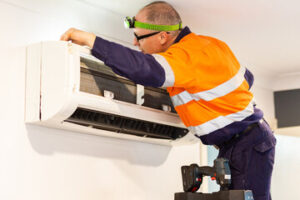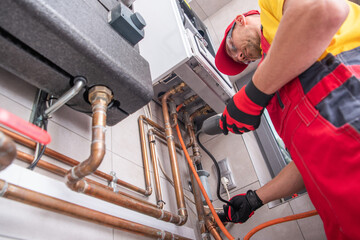“Keeping Your Cool: Understanding the Vital Role of AC Repair
An ineffective air conditioning system can cause uncomfortable temperatures, poor airflow, and elevated energy bills. 
However, DIYers should take safety precautions when performing AC repairs: Use personal protective equipment, isolate power before maintenance or testing, and clean coils and fins to prevent clogs.
One of the most important parts of AC repair is identifying what needs fixing. This may include checking refrigerant levels, inspecting wire connections or testing capacitors within the circuit board depending on what part of the system is having problems. Identifying the problem first also helps determine how much work is necessary to restore your system to proper operation. If there is a simple issue, such as a faulty thermostat or clogged ductwork, the cost of repair should be fairly reasonable. However, if the compressor or fan motor is having issues it will likely push the repair costs toward replacement.
A common sign that your air conditioner is having issues is when it won’t turn on. If the thermostat is set to a realistic temperature but it still won’t come on it’s time to call in a pro for an AC repair. This could be a sign that the condenser coil is frozen, causing it to stop working properly. It could also be a sign that the system is overheating due to low refrigerant levels.
Another common sign that the AC unit is having issues is a high energy bill. If the energy bill is going up quickly without any increase in usage it’s a good indicator that the system isn’t running efficiently. This can be due to a variety of issues, such as an old or broken thermostat switch, air leaks in the ductwork or a malfunctioning compressor.
The first thing that you should do if your AC unit isn’t turning on is check the circuit breaker to make sure it’s turned on. You should also ensure that the air filter is clean and that all vents are open in each room. You should also check that there are no clogs in the drain pipe or any obstructions that could cause water build up. Lastly, you should walk around the outside of the home and clear away any debris that may be obstructing the unit. It’s a good idea to move any trees, fences or shrubbery that are within 2 feet of the outdoor unit away from it as well.
Troubleshooting
If you have a problem with your air conditioner, there are certain troubleshooting techniques that can help you determine what needs to be fixed and how. This process involves inspecting and servicing all components within the system, making sure they are properly connected and identifying any potential problems that need to be addressed before moving on to other procedures for repair.
Frequently Tripped Circuit Breakers
If your AC unit keeps tripping the circuit breaker, it is usually due to an overheated or overloaded unit. Often, a professional will be needed to clean out the thermostat to make sure it is functioning correctly and not causing the system to overheat. The same goes for a faulty wire that is supplying current to the AC equipment, which can also cause short-circuiting and even further damage to the unit.
Strange Sounds Coming From the AC Unit
If your air conditioning is running but you hear unusual or unfamiliar noises, it is time to call a technician. Most AC issues come from worn out parts or a simple problem like an airflow issue that can be easily resolved by a technician. Other noises that are a sign of an AC problem include a whine or whistle, which can indicate the need for replacement coils.
Water Leaks from the AC Unit
If water starts leaking from your air conditioner into your home, it is most likely because of a clogged drain line or a broken drain pan. You can try using a wet/dry vacuum or cleaning the drain pan yourself, but more often than not, the problem will require professional assistance to fix.
Warm Air Coming From the Vents
Often, people will call an AC service when their unit is blowing warm air, but this is not always the case. The issue could be as simple as a tripped circuit breaker or more serious, such as a refrigerant leak. The best way to tell is to have a professional inspect and perform an air conditioning service.
The best way to prevent AC problems is with a regular air conditioner maintenance service. During these services, professionals will look for signs of wear and tear that may not be apparent to the average homeowner and address them before they turn into expensive and inconvenient AC problems.
Repairs
It’s a good idea to bring in a professional air conditioning repair technician before trying to do any work on your own. This will ensure that the problem is addressed properly and your AC unit is returned to normal operation. While each system may require a slightly different approach, the general process of restoring an air conditioner to working order involves inspecting the various components, servicing what needs it and making any repairs that are necessary.
The most common issues that can cause an AC unit to fail are related to the power supply, capacitors and coils. These are relatively easy to diagnose and fix, but can still be costly if the issue is not addressed quickly. In most cases, a service tech will check the thermostat and circuit breaker before moving on to inspect the coils and fans. They will also check ductwork for leaks, hot and cold spots, odors and airflow.
Capacitors are another part of an air conditioning unit that is prone to failure. These are electrical components that store energy and then release it to the compressor and outdoor fan when they are activated. When a capacitor fails, the system will not start, or may only run intermittently. It’s an inexpensive part that is relatively easy to replace.
A service technician can also replace a contactor, which is a switch that’s responsible for turning other parts of the system on and off. This is another affordable, relatively simple replacement that will restore the AC system to normal operation.
In addition to checking filters and removing any animal nests or other debris that has found shelter in the unit, an AC service technician can also test the humidity levels of a home. This information can be used to adjust the system’s capabilities based on the level of humidity in a given area.
In some cases, it may be necessary to replace an entire AC system if repairs are not cost effective. This can be the case when the system is approaching 10 years of age or if it’s experiencing frequent breakdowns, increased energy usage or other problems that warrant a replacement. A reliable ac repair company will provide options for replacements along with estimating the cost of both repairs and new systems so that clients can make informed decisions based upon budget constraints.
Replacement
A quality AC technician will keep a close eye on the age of your unit and let you know when it’s time to start thinking about replacement. They can help you demystify all the new options available to you, whether that’s a heat pump or a ductless mini-split system. They can also explain the benefits and drawbacks of each option, helping you make the best decision for your home.
Most of the calls an HVAC company receives for air conditioner repair are made when a homeowner notices the house isn’t cool enough anymore or the system just stops working altogether. If you keep up with regular maintenance appointments, this kind of problem will be minimized or avoided completely. During those service visits, technicians can identify small problems and fix them right away. That way, they won’t turn into big problems that could ruin the unit.
The first thing that a technician should do if they suspect a problem with your AC unit is check the air filter. A clogged filter can cause the system to overwork itself and can lead to a breakdown. Luckily, replacing the filter is an easy DIY task.
Another common issue that a technician will encounter is a dirty condenser coil. This can be due to an excessive amount of dust or even insect nests. Both of these issues can be avoided by keeping up with maintenance appointments and removing any debris from around the unit.
A good AC repair technician will also be able to check the level of humidity in your home. Too much humidity can have serious health consequences and isn’t comfortable for anyone in the home. It can lead to mold, mildew and musty smells. It’s also not conducive for people with asthma or respiratory problems. An experienced technician will be able to fix this problem and prevent it from occurring in the future.
Ultimately, repairing an air conditioning system is usually cheaper than replacing it. However, if an older unit is a safety hazard and can’t be repaired, it may be necessary to get a new one.

